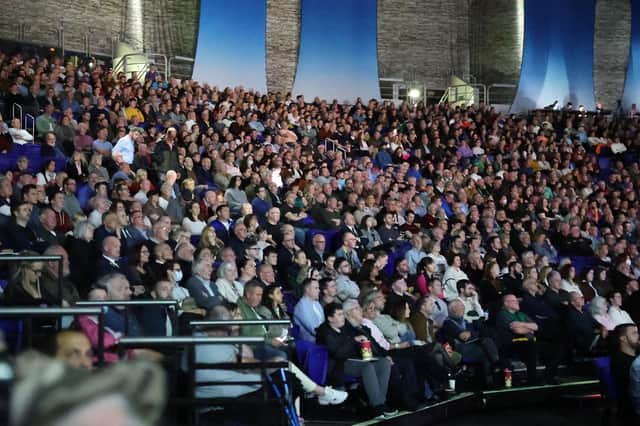Ruth Dudley Edwards: I recommend Malachi’s honest look at the obstacles to an all Ireland


I read it over the weekend as Ireland’s Future held its extravaganza ‘Together We Can’ in Dublin.
It has a pretty narrow definition of ‘together’. There wasn’t a unionist about the place, which was hardly surprising since the organisation describes its purpose as ‘Paving the way to the reunification of the island’.
Advertisement
Hide AdAdvertisement
Hide AdAnd it’s improbable that any non-republican would be enticed by an organisation whose chairperson is Frances Black (who described herself as “honoured” to sing a song at Martin McGuinness’s funeral — “a very sad farewell to a great man”) and whose board includes among its like-minded, Brian Feeney of the Irish News, whose distaste for unionists seems to me to have grown more acute by the year.
His most recent article began “This failed polity, whose inhabitants can’t even agree what to call it, is coming to an end”.
In the same article, Feeney was complaining that “purblind unionists” were failing to address “unstoppable” and “fundamental change”.
He recommended four recent books: ‘United Nation: the case for integrating Ireland’; and ‘A United Ireland: why unification is inevitable and how it will come about’; and ‘Irish unity: time to prepare’; and ‘Making Sense of a United Ireland: Should it happen? How might it happen?’ — which might seem more even-handed.
Advertisement
Hide AdAdvertisement
Hide AdIt is, however, by Brendan O’Leary, a political scientist who along his career path was the right-hand man to Kevin McNamara, who for seven years as pre-Blair Labour’s Shadow Secretary of State for Northern Ireland argued passionately for a united Ireland.
Ireland’s Future seems to be aimed at the ignorant, the true believers and the gullible.
I’m not surprised Feeney didn’t mention Can Ireland Be One? — an honest, enormously readable, exploration of the obstacles to uniting the two jurisdictions on the island.
O’Doherty is a constitutional agnostic, whose only bias is favouring a future that works — not one impelled by an ill-thought-out ideology which at worst could lead to “a perpetually tangible and conspicuous factory of grievances; an Irish Gaza perhaps with a population of half a million people and high unemployment among them”.
Advertisement
Hide AdAdvertisement
Hide AdAnd, he adds chillingly but realistically: “We can’t expect that violence would stop because the issue of the constitution had been settled.”
O’Doherty has the great advantage of having different lineages: his father was inclined towards republicanism, his mother towards Britishness.
From his perspective, Ulster Protestants “represent a mixing of two nations and are no more British than they are Irish. They are a distinct people”.
He was born in Donegal, but the family relocated to Northern Ireland, where they appreciated a more generous welfare system, and a nice house allocated without any discrimination.
Which doesn’t mean he was blind to sectarianism.
Advertisement
Hide AdAdvertisement
Hide AdImportant O’Doherty targets are hypocrisy and self-delusion, which he skewers mercilessly. Having like him come from a largely Catholic and nationalist background with relatives in the British military (whom I never mentioned at school in Dublin), I particularly liked this crisp paragraph describing our history as it was, not as it was refashioned after the Great War.
“We tell each other the story of Ireland’s historic battles for freedom, but we exclude Irish participation in the Napoleonic wars, the American Civil War, the colonisation of India and many others. In fact, the story of the Irish at war is much more than just the record of occasional rebellions. And while we like to think of the Irish soldier as a noble and principled lover of freedom, when we look back we find him in the Boer Wars, at the Crimea and of course, in the trenches at Flanders.”
And I couldn’t better this: “Sinn Féin is in the Fenian tradition. The Provisional movement traces its mission back to the Easter Rising. But the republican aspiration has changed many times, from seeking a Catholic Ireland to seeking socialist revolution; from rejecting the legitimacy of the Dáil to entering it; from opposing capitalism, to inviting and facilitating capital investment from abroad; from opposing EU membership to endorsing it, though only apparently because it might provide an added motivation for the one unchanging principle that drives them: creating a single island jurisdiction and writing the IRA into the story as a creative and helpful, noble and self-sacrificing guide along the way.”
There was a heart-rending letter about the Ireland’s Future event in this newspaper yesterday from victims’ champion Edward O’Neill, still enduring constant pain and surgery for his appalling injuries in the 1974 Dublin loyalist bomb.
Advertisement
Hide AdAdvertisement
Hide Ad“People engaged in this discussion of a united Ireland are missing the point by miles. And unbelievably sad that so many so called intelligent people are allowing themselves to be associated with this agenda.
“For any person attempting to engage any person of a unionist background into this united Ireland discussion stop telling them there was no alternative to the violence. Many had relatives murdered in front of them. The immeasurable trauma and grief of that will never leave them.”
I hope interviewers will challenge Professor Colin Harvey, Ireland’s Future’s front man, with this.
And ask him what he thinks of Malachi O’Doherty’s brilliant book.